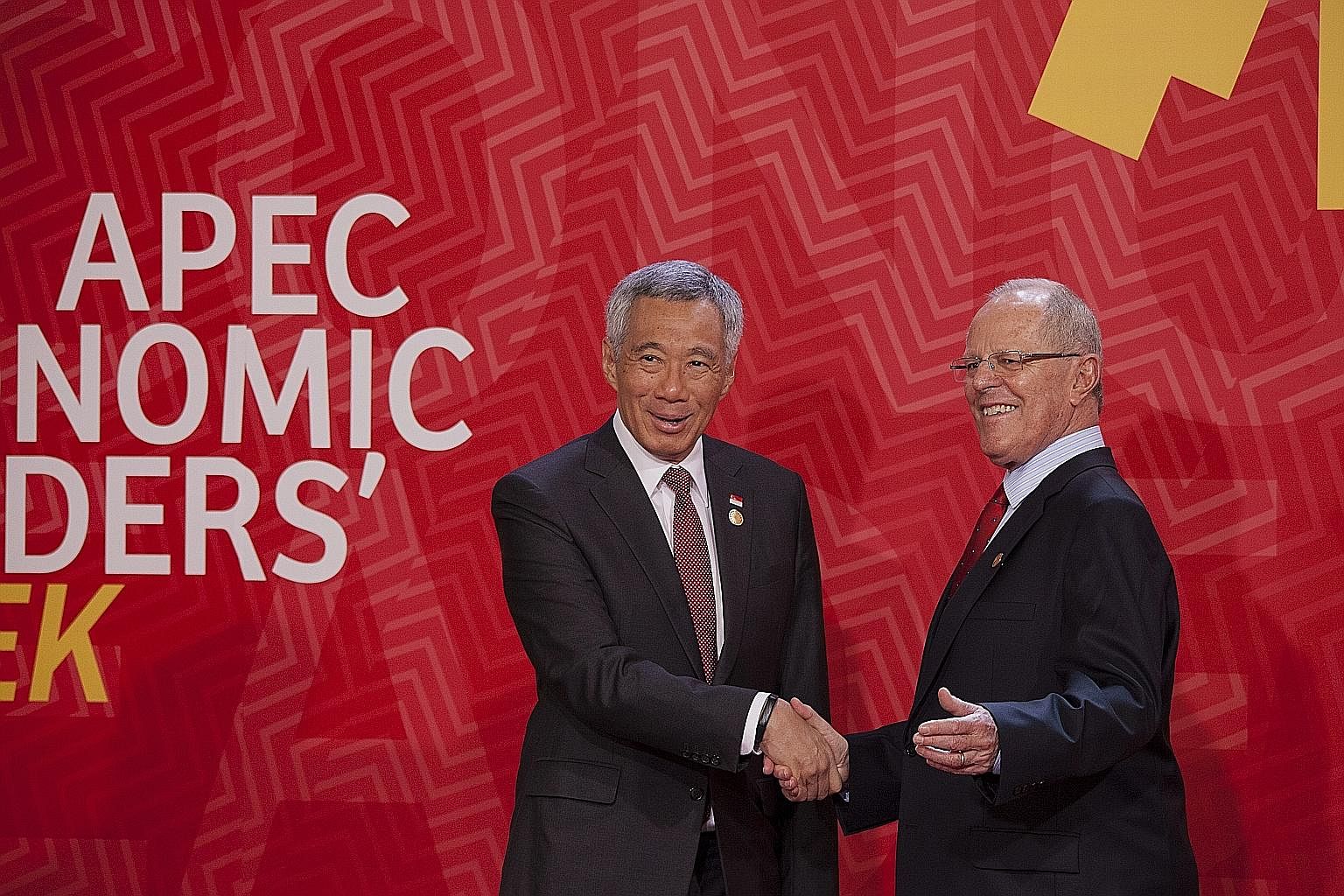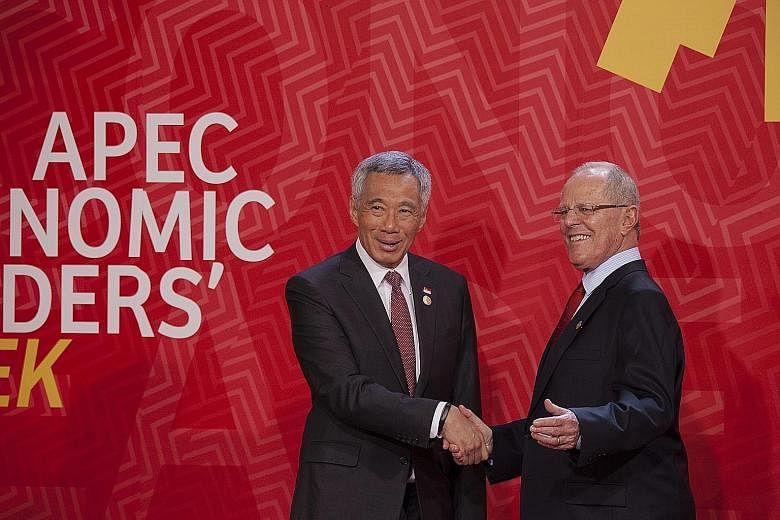Q New Zealand Prime Minister John Key said he sensed tremendous despair when he was in Peru because the US elected a candidate that campaigned on a protectionist, anti-trade platform. So what is your take on the mood throughout the meetings and particularly at the Trans-Pacific Partnership (TPP) Leaders' Meeting?
A I would not put it in quite the same way. I think what happened in America is very, very significant; we know how President-elect (Donald) Trump campaigned and the platform on which he campaigned. Now we will have to see how he assembles his team and what policies they settle on once they have come into office, studied the problems and weighed the options. So I think it is a mood of watchfulness, of waiting to see, and being cautious not to foreclose options prematurely so that you find yourself at a dead end unnecessarily.
So when it comes to the TPP, we discussed it among the members, you saw what I said at that meeting, which is that we will continue with the ratification process. I think many of the countries are going to do that. Then we will see how the Americans decide and how they would like to take it forward, and if in fact after two years they do not take it forward, well then, we will examine our options again. We still have some time.
Q You stressed that the fundamentals of TPP remain unchanged. But looking at the timeline, with the possibility of the TPP without the US looming in the background, would that not affect the TPP's quality, a trade agreement that was meant to set the bar?

A Well when I say the fundamentals remain unchanged, I mean the fundamental justification for the TPP is valid, we believe in it, and I think it is still valid.
The TPP as an agreement has got rules as to when it comes into effect - what, how, when does it happen. The rules say that within the first two years, it will come into effect when all 12 countries ratify it. Beyond the first two years, if we have not got 12 countries, if we have 85 per cent of the GDP and six countries ratified, then it comes into effect. So in other words, there is an established definition as to when the TPP comes into effect. And it could still happen, but to happen, it requires the United States, so we will have to see how that goes.
The TPP without the US means it is a new agreement, that means, the 12 minus one will have to get together and sign an agreement with a different coming-into-effect clause. And that is fresh negotiation, and that is not so easy to do because New Zealand is taking the present treaty through their Parliament and Japan is taking their present treaty, it cleared the Lower House, it is going to the Upper House, so if you sign a fresh agreement, you have to go through it again. So we have not come to that bridge yet, we will cross it if and when we come to that.
Q Did countries express concern during the TPP Leaders' Meeting and did President Barack Obama give any reassurances in terms of the US' involvement?
A Well, President Obama basically said the President-elect comes in with his team; the team will have to study the options and will have to reach conclusions as well on what they will do and what they will not do, and if you look at previous presidential elections, quite often positions are taken during the campaign which, after the team has won, you come into office and reassess your position and you may have to modify your position in the light of what you discovered, in the light of the test of reality and experience.
And it has happened with every campaign, whether it is George Bush Sr, whether it is Clinton, whether it is George Bush Jr, or even Mr Obama himself. So I fully expect that when the new administration comes in they will have to review their positions, but of course this time the US campaign has been a lot harsher than previous ones, in tone and in rhetoric. And so to make an adjustment is harder, but we have to wait and see.
Q If the US actually takes a more passive role when it comes to pushing for free trade, how will that affect the strategic balance in the Asia-Pacific region?
A Well, we have always believed that the US engagement in the region is a plus, and is a plus not just because of the security aspects but also because of the economic aspects, as well as trade. So if you do not have that, you lose something valuable. If in fact the US turns inwards and becomes protectionist and anti-free trade, then of course the loss is even greater. But whether that happens is speculation. We will have to see how events develop.
Q Japan's Prime Minister Shinzo Abe said that if the TPP does not go on with the momentum, it will die forever and then there will be a spread of protectionism. He put it in very stark terms. Would you put it in the same way?
A I think it will be a great loss if we do not have the TPP. It is a very important deal, it is strategically significant, it is economically very considerable, it covers 40 per cent of the world's GDP, and it would make a lasting contribution to the stability and the prosperity of the region. So we lose that, well, life goes on, but you have lost something precious and which would have been very worthwhile having.
And you will one day try to make a different deal, but it will have to be a fresh deal under new conditions, and it will not be easy to negotiate. Because to reach a deal like this, the TPP itself has taken, what, six years of negotiation, eight years since we started, and then six since the US came on board and very hard work, enormous amount of effort, argy-bargy, compromise, deals worked out.
Finally you have a package, a document several thousand pages long. And it is valid, you should sign it. If you do not sign it, time passes, new events develop, new technology, new markets, new economic trends, it becomes harder to sign the agreement and you have to negotiate a new one then. And that is not so easy.
Q On elections, in the US, we saw that there was a group of voters who expressed their grievances that they were not heard by the political establishment. In Singapore, there was a piece by an academic who called GE2011 a "mini-Brexit", Dr Gillian Koh. She described the GE2011 as our "mini-Brexit" vote because of the hot button issues - immigration and labour policy. What lessons can be drawn from the recent US election results?
A I think in any election there is a mix of motives, people vote for or against the political party. It is partly the policies, it is partly the promise, it is partly an emotional identification or lack of identification, sometimes it is a desire for change. One of the factors which will influence voters is whether they feel in a good mood or not, whether they are satisfied or not with life, and that depends on what their expectations are and how things have turned out. And sometimes the world develops in a certain direction and you have to go with it. And it can be very difficult to go with it.
I mean, the changes induced by globalisation, the Rust Belt problems, the uncertainty of jobs, these are real problems, which people feel. You have to address them, you have to make people not only deal with the problems but make people feel their concerns have been heard and have been attended to.
At the same time, also be able to get people to understand that there are problems, but some of these are not avoidable and are not something which the government can wish away or which are a result of the wrong set of policies. Because technology changes, the economy changes, some of these... you can't easily control just by issuing a policy. So when it comes to the election, it's how do people feel, how well have you met their aspirations, at the same time, how well have we been able to make people understand what is happening, and accept that we are doing the best for them. And sometimes you do better, you get strong support, sometimes you don't and then you lose some votes.
I think Brexit and the US presidential elections, compared to what happened in Singapore, I think there's massive difference in scale.
Q How then do we prevent such sentiments from taking hold in Singapore, taking into account that people's mood could perhaps change?
A There is no magic formula, you have to work together, you have to work hard. The Government must have policies which generally will be working for people. At the same time, we have to develop a sense of identity and togetherness within Singapore so that you don't have a deep divide within the society.
In Brexit and in the US, I think there is a very deep divide, in the US between the blues and the reds, the Democrats and the Republicans, two sides. The Democrats, many of them are in the cities and the two coasts. The Republicans are in the mid-west and the heartlands.
In the case of Brexit, there was also divide, a divide geographically between London and the rest of the provinces, the rest of England; educationally between the well-educated and the not so well-educated; and also in terms of income, between the better-off and the not so well-off. So these are social divides which we have to try very hard not to allow to widen and to split our society because if you do, you may mean well, but to rebuild those bridges, it's very difficult.
Q When you spoke about America's rust belt, you emphasised the need for equity. Is your government looking at policies for aggressive redistribution?
A What we have been doing is what we believe is the way forward. On the one hand, to focus a lot on giving our people skills and abilities which will help them to do well in the new economy whether in schools, polys, universities, ITE, or in life through SkillsFuture. On the other hand, to make sure that everybody feels fairly treated and if you're not doing so well on your own, well you get an extra leg up.
So therefore we have Workfare which is a very substantial scheme. We've got schemes like Pioneer Generation package to take care of (the) older people... and we've got basic schemes like our healthcare system, our HDB home ownership schemes, which make everybody know that if you're in Singapore, not everybody is equally well off, but even if you're not well-off, you're not badly-off.
I think that's very important and if you compare to where we were just 10 years ago, the schemes which we have introduced and the amount which we are doing and spending, it's gone up considerably.
So I think the spending, the welfare scheme, the social safety nets is one part, but the self-reliance and giving people the ability to look after themselves and investing in people, I think that is another very important part.

